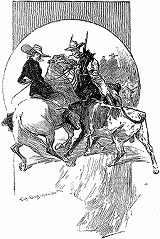She had reached the outskirts of the city when she found the road blocked by a great drove of cattle, driven by a half-dozen wild-looking herdsmen from the plains. In her impatience she endeavoured to pass this obstacle by pushing her horse into what appeared to be a gap. Scarcely had she got fairly into it, however, before the beasts closed in behind her, and she found herself completely embedded in the moving stream of fierce-eyed, long-horned bullocks. Accustomed as she was to deal with cattle, she was not alarmed at her situation, but took advantage of every opportunity to urge her horse on, in the hopes of pushing her way through the cavalcade. Unfortunately the horns of one of the creatures, either by accident or design, came in violent contact with the flank of the mustang, and excited it to madness. In an instant it reared up upon its hind legs with a snort of rage, and pranced and tossed in a way that would have unseated any but a skilful rider. The situation was full of peril. Every plunge of the excited horse brought it against the horns again, and goaded it to fresh madness. It was all that the girl could do to keep herself in the saddle, yet a slip would mean a terrible death under the hoofs of the unwieldy and terrified animals. Unaccustomed to sudden emergencies, her head began to swim, and her grip upon the bridle to relax. Choked by the rising cloud of dust and by the steam from the struggling creatures, she might have abandoned her efforts in despair, but for a kindly voice at her elbow which assured her of assistance. At the same moment a sinewy brown hand caught the frightened horse by the curb, and forcing a way through the drove, soon brought her to the outskirts.

“You’re not hurt, I hope, miss,” said her preserver, respectfully.
She looked up at his dark, fierce face, and laughed saucily. “I’m awful frightened,” she said, naively; “whoever would have thought that Poncho would have been so scared by a lot of cows?”
“Thank God, you kept your seat,” the other said, earnestly. He was a tall, savage-looking young fellow, mounted on a powerful roan horse, and clad in the rough dress of a hunter, with a long rifle slung over his shoulders. “I guess you are the daughter of John Ferrier,” he remarked; “I saw you ride down from his house. When you see him, ask him if he remembers the Jefferson Hopes of St. Louis. If he’s the same Ferrier, my father and he were pretty thick.”
“Hadn’t you better come and ask yourself?” she asked, demurely.
The young fellow seemed pleased at the suggestion, and his dark eyes sparkled with pleasure. “I’ll do so,” he said; “we’ve been in the mountains for two months, and are not over and above in visiting condition. He must take us as he finds us.”
“He has a good deal to thank you for, and so have I,” she answered; “he’s awful fond of me. If those cows had jumped on me he’d have never got over it.”
“Neither would I,” said her companion.
“You! Well, I don’t see that it would make much matter to you, anyhow. You ain’t even a friend of ours.”
The young hunter’s dark face grew so gloomy over this remark that Lucy Ferrier laughed aloud.
“There, I didn’t mean that,” she said; “of course, you are a friend now. You must come and see us. Now I must push along, or father won’t trust me with his business any more. Good-bye!”
“Good-bye,” he answered, raising his broad sombrero, and bending over her little hand. She wheeled her mustang round, gave it a cut with her riding-whip, and darted away down the broad road in a rolling cloud of dust.